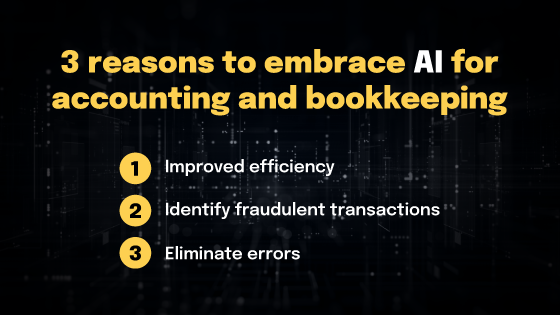Jump to a section
As a small business owner, your most valuable asset is time. Tasks like tedious data entry and reconciling accounts, while essential, can consume a significant amount of your time and divert your attention from your core business activities.
Now, picture a scenario where you can reclaim hours of your valuable time each week by harnessing the power of AI to automate your accounting tasks. By embracing AI-powered tools and technologies, you can streamline your financial processes, improve accuracy, and regain the freedom to focus on what truly matters – driving your business forward.
AI has already revolutionised productivity, efficiency, and decision-making across various industries, and this is predicted to continue; according to Grand View Research, AI is projected to experience an annual growth rate of 37.3% between 2023 and 2030. This growth indicates a vast array of transformative opportunities waiting to be tapped into by small businesses like yours.
What is AI, and why should small businesses owners care about it?
AI, or artificial intelligence, is computer systems that can learn and make decisions that would typically require human intelligence, such as decision-making, and problem-solving.
Its ability to learn and make decisions is invaluable to small business owners, particularly in relation to your accounting and bookkeeping processes.
3 reasons your small business should be using AI for accounting and bookkeeping
AI is no longer reserved exclusively for the big corps with deep pockets. The emergence of free, or more affordable software gives access to these powerful tools to businesses of all sizes. Small business owners now have the opportunity to take advantage of AI without incurring high costs or needing data science expertise.
The obstacles that once stood in the way of leveraging AI for small business accounting and bookkeeping have been removed, paving the way for small businesses to embrace this transformative technology.
Here are 3 reasons why small business owners should embrace AI-powered accounting and bookkeeping solutions:
1. Improve efficiency
Traditional bookkeeping and accounting tasks can be incredibly time-consuming, often involving laborious processes such as data entry, payroll calculations, forecasting, tax preparation, and managing accounts payable and receivable. This takes valuable time away from core business activities for many small business owners.
AI can automate these repetitive and mundane tasks, such as data entry, categorization, and reconciliation, reducing the burden on small business owners, and potentially saving them from hiring accountants.
2. Identify fraudulent transactions
AI's ability to analyse historical data and detect fraud patterns can provide your small businesses with a proactive defence mechanism against fraudulent transactions.
AI can sift through vast amounts of financial data, identifying subtle patterns and irregularities that might indicate fraudulent transactions that you may miss if analysing the data by hand. This real-time analysis ensures that fraudulent activities can be swiftly addressed, minimising the impact on your small business.
For example, if your small retail business processes hundreds of transactions daily, without AI-powered tools, detecting fraudulent activities within this high volume of transactions would be a time-consuming and challenging task. However, with the aid of AI algorithms, suspicious patterns can be identified, such as recurring unauthorised transactions, irregular purchasing behaviour, or unusually large refunds. By promptly flagging these anomalies, AI allows you to respond swiftly and prevent financial losses.
3. Eliminate errors
The potential for human error in manual bookkeeping processes is a significant concern for many small business owners as it can lead to financial inaccuracies and costly mistakes - the last thing any small business owner wants.
However, AI-powered accounting software offers a solution. You can use it to automate error checks and validate transactions, mitigating the risks associated with manual entry.
As well as streamlining tasks such as forecasting, tax preparation, and payroll calculations, it also ensures precision and efficiency in the process. It not only eliminates the possibility of human error, but also provides accurate insights and reduced risks in financial management.

Choosing the right tools for small business accounting
Xero
Xero can effortlessly handle your bill payments, cash flow reconciliation, and sales tax calculations, among many other features. It also has the ability to forecast account balances, providing valuable insights for informed decision-making, and integrate with your Capital on Tap Business Credit Card account.
Additionally, Xero supports real-time collaboration, allowing multiple users to work together seamlessly.
Quickbooks
With the assistance of AI, QuickBooks simplifies crucial tasks such as invoicing, expense and inventory tracking, and generating accounting reports. The software not only automates these processes but also ensures accuracy and efficiency.
QuickBooks also supports multiple users, enabling real-time collaboration.
Booke
Booke can handle your bookkeeping and accounting tasks with its advanced automation capabilities. It is renowned for fixing uncategorised transactions and auto-categorising them. It also provides expert reconciliation suggestions, enhancing your client communication and collaboration.
Two-way integrations with popular platforms like Xero also ensure seamless data exchange. The tool also features real-time invoice and receipt OCR for efficient data extraction, and audit insights which allow you to obtain discrepancy insights directly from QuickBooks or Xero.
Zeni
Zeni was one of the very first pieces of AI software for small business accounting and bookkeeping.
The Zeni Dashboard provides 24/7 access to vital metrics, including your business’ net burn, cash on hand, operating expenses, and cash zero date, plus other financial data and trends.
Docyt
Docyt is an advanced AI accounting software that collects and organises your data, then provides actionable workflows, real-time business insights, and seamlessly updates and reconciles your accounting software.
Docyt can actively collect data from your bank feeds and POS revenue reports, and data from your payroll systems and accounting software. You can also scan, photograph or email them to Docyt to be organised and reconciled.
Docyt allows you to invite your employees, service providers, clients, and business partners into your Docyt, select their individual access levels and share real time metrics with them.
Which AI tool for small business accounting is right for you?
When it comes to selecting the right AI tool for your small business accounting, it's important to consider key features, pricing models, and integrations
To evaluate and select the right AI tool for your small business accounting needs, consider your specific requirements and budget. Assess the features and capabilities of each tool; evaluate pricing models, including whether it's a subscription-based plan or a pay-as-you-go option and whether it’s within your budget; consider the ease of integration with your existing accounting software or other platforms you use; look for user reviews, testimonials, and demonstrations to gain insights from other small business owners who have used the same AI tools.
As a Capital on Tap customer, you can export all your transactions to your chosen AI accounting software. This convenient feature ensures that your bookkeeping process becomes even more streamlined and efficient.
By carefully evaluating and selecting the AI tool that best fits your accounting needs, you can streamline your financial processes and unlock the benefits of automation and advanced insights for your business's success.
The bottom line
AI offers numerous benefits for small business accounting and bookkeeping. By leveraging AI, you can save valuable time and focus on doing what you do best, serving your customers.
AI accounting software can also play a vital role in fraud prevention, identifying suspicious activities and minimising financial risks to your business. The improved accuracy provided by AI ensures you have reliable financial data for making informed decisions.
Embrace the power of AI and unlock the potential for growth and efficiency in your business today.
This does not constitute financial advice. If you want to understand your accounting responsibilities in detail, you should speak to your financial advisor or accountant.











